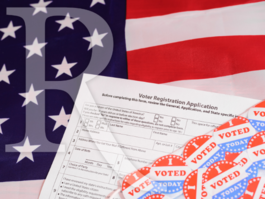Election 2024: Would You Cheat to Win? 28% Say ‘Yes’
More than one-in-four voters say they’d be willing to engage in illegal voting activity if it would help their preferred candidate win the 2024 presidential election.
A new national telephone and online survey by Rasmussen Reports and The Heartland Institute finds that 28% of Likely U.S. voters would engage in at least one kind of illegal voting practice if that was “the only way to stop” an opposing candidate from winning, while 72% say they would not cheat. (To see survey question wording, click here.)
There is little variation in the willingness to cheat whether voters support President Joe Biden, former President Donald Trump, third-party candidate Robert F. Kennedy Jr. or some other candidate. Twenty-seven percent (27%) of Biden voters, 29% of Trump voters and 25% of RFK Jr. voters answered “yes” to at least one question about whether they’d engage in various illegal voting practices.
“Doing the math, that means that – if voter turnout remains similar to 2020 – nearly 45 million ballots may be fraudulently cast if they are not prevented," said Jack McPherrin, Research Editor and Socialism Research Center Fellow at The Heartland Institute. “The results of this poll will hopefully galvanize state policymakers to craft legislation designed to ensure election integrity by vastly restricting mail-in voting.”
(Want a free daily e-mail update? If it’s in the news, it’s in our polls). Rasmussen Reports updates are also available on Twitter or Facebook.
The survey of 1,467 U.S. Likely Voters was conducted on April 5-10, 2024 by Rasmussen Reports and the Heartland Institute. The margin of sampling error is +/- 3 percentage points with a 95% level of confidence. Field work for all Rasmussen Reports surveys is conducted by Pulse Opinion Research, LLC. See methodology.
The survey found that 45% would vote for Trump, 36% for Biden and 11% for Kennedy. Another four percent (4%) say they would vote for some other candidate, while three percent (3%) are undecided.
The new poll follows up on a Rasmussen Reports/Heartland Institute survey in December that found more than 20% of voters who used mail-in ballots in 2020 admit they participated in at least one form of election fraud.
In the new survey, 18% of all Likely Voters said that, if their spouse or another trusted family member gave them permission to fill out and sign their mail-in ballot, allowing them to use their ballot to vote for a candidate of their choice, they would. Similarly, 17% said they would fill out and sign a mail-in ballot on behalf of a coworker or friendly acquaintance, and 14% would do so on behalf of a close friend.
Nine percent (9%) said that, if given the opportunity, they would alter the candidate selections made in a mail-in ballot belonging to a friend or family member, without their knowledge. Voters who answered “no” or “not sure” to that question were then asked: “If altering the candidate selection were the only way to stop [Joe Biden / Donald Trump] from being elected, then would you do it?” Biden voters were asked about stopping Trump from being elected, while Trump voters were asked about stopping Biden; undecided voters and supporters of other candidates were asked if they would alter a ballot if it “were the only way to help your candidate get elected.” Eight percent (8%) said yes.
Asked whether they would throw out or destroy a mail-in ballot belonging to a friend or family member, without their knowledge, to help win the election, 11% answered yes. Ten percent (10%) said they would vote in two different states to help their candidate win, 10% would offer to pay another voter for their vote and 10% said they’d give another voter misleading information about the time and place of the election if that would help their candidate win. All such activities would be crimes under federal law.
“Our survey clearly indicates that millions of voters, both Democrats and Republicans alike, are willing to vote illegally and even to commit serious crimes in order to stop political opposition,” said Justin Haskins, director of the Socialism Research Center at The Heartland Institute. “As deeply troubling as these survey results are, however, the even bigger story is that state lawmakers have not put election integrity policies in place that will stop cheating in 2024 and beyond.”
Most voters don’t think the Republican Party has been effective at winning elections, and agree with the new RNC chairman’s emphasis on having election observers in polling places.
One of Joe Biden’s key promises during the 2020 election campaign was that he would unite Americans, but most voters say he’s done a poor job of it.
Additional information from this survey and a full demographic breakdown are available to the public as well as to Platinum Members.
Please sign up for the Rasmussen Reports daily e-mail update (it’s free) or follow us on Facebook. Let us keep you up to date with the latest public opinion news.
The survey of 1,467 U.S. Likely Voters was conducted on April 5-10, 2024 by Rasmussen Reports and the Heartland Institute. The margin of sampling error is +/- 3 percentage points with a 95% level of confidence. Field work for all Rasmussen Reports surveys is conducted by Pulse Opinion Research.
Rasmussen Reports is a media company specializing in the collection, publication and distribution of public opinion information.
We conduct public opinion polls on a variety of topics to inform our audience on events in the news and other topics of interest. To ensure editorial control and independence, we pay for the polls ourselves and generate revenue through the sale of subscriptions, sponsorships, and advertising. Nightly polling on politics, business and lifestyle topics provides the content to update the Rasmussen Reports web site many times each day. If it's in the news, it's in our polls. Additionally, the data drives a daily update newsletter and various media outlets across the country.
Some information, including the Rasmussen Reports daily Presidential Tracking Poll and commentaries are available for free to the general public. Subscriptions are available for $4.95 a month or 34.95 a year that provide subscribers with exclusive access to more than 20 stories per week on upcoming elections, consumer confidence, and issues that affect us all. For those who are really into the numbers, Platinum Members can review demographic crosstabs and a full history of our data.
To learn more about our methodology, click here.





